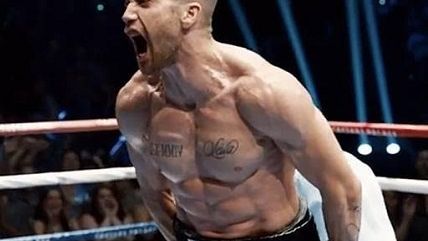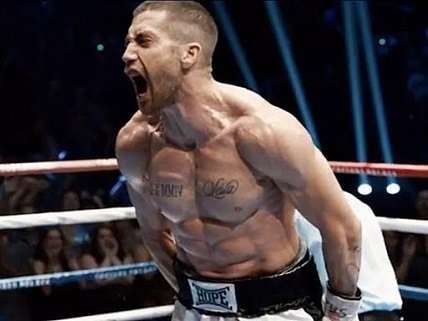Movie Review: Southpaw
Jake Gyllenhaal gets in the ring for a fierce but flawed boxing film.


Southpaw might not be a movie you want to go 12 rounds with. The picture inevitably recalls Martin Scorsese's Raging Bull, as well as a number of other boxing movies, reaching back to the old Wallace Beery-Jackie Cooper heart-walloper, The Champ. Unlike those films, though, and despite a trio of top-flight performances, Southpaw raises nagging questions that are never answered, or even considered, by writer Kurt Sutter (Sons of Anarchy) or director Antoine Fuqua (Training Day). The movie is packed with raw energy, but it doesn't quite knock you out.
Still soaring after last year's Nightcrawler, Jake Gyllenhaal digs deep into the role of Billy Hope, the densely tattooed light-heavyweight champion of the world. (Unfortunately, his name announces the movie's emotional trajectory.) Billy isn't a fighter of the float-like-a-butterfly school; he's a brawler, willing to absorb the bloodiest punishment in order to weary his opponents and ultimately batter them into submission. This primitive ability has paid off in a big way: Billy lives in a huge mansion in upstate New York, which he shares with his beloved wife, Maureen (Rachel McAdams), and their precocious daughter, Leila (the uncannily talented Oona Laurence, age 11 at the time the movie was shot).
Billy has it so good that we know he won't have it for long. He's being dogged at every turn by a sneering Colombian fighter named Escobar (Miguel Gomez), who loudly proclaims that Billy is afraid to take him on in a title match. I don't think it's a "spoiler" (since the movie's trailer already beat me to it) to relate that in a confrontation with Escobar and his surly crew, a gun is drawn and Maureen is accidentally shot; she dies in Billy's arms. (It is a tribute to the actors' skill that they're able to play this moving scene without over-pushing its melodramatic manipulation.)
Billy's life goes downhill quickly. Near-suicidal after the loss of his wife, he intentionally crashes his car into a tree. Child-welfare authorities take Leila away, and he's forced to give up his house and just about everything else to pay off the many debts he racked up in his now-fading heyday. He also loses his longtime manager, the snaky Jordan Mains (upwardly mobile rapper 50 Cent), which could be a good thing.
Down but not entirely defeated, Billy seeks out Tick Wills (Forest Whitaker), an ex-boxer who now trains young up-and-comers. Tick sees that Billy is a wreck, but agrees to coach him for an upcoming title bout against the strutting Escobar. Tick's rehabilitation of Billy is of course successful, and by the time the story moves to Las Vegas for the big match, you can't be wondering too hard how it will end—especially after Billy manages to get Leila back and bring her along.
In the brutal manner established by Scorsese in his earlier classic, Fuqua puts us right into the ring to soak up the punches along with his protagonist. These vicious scenes bring us to the brink of exhaustion, but the director knows when to cut them off, and they never beat us all the way down. And Gyllenhaal, festooned with cuts and bruises, with ribbons of bloody drool swaying off his chin, keeps us rooting for Billy, making us feel his furious determination. (It helps that we understand what drives him: unlike Scorsese's Jake La Motta, who is basically a cipher, Billy has his reasons—he's an unloved product of the child-welfare system that has claimed his daughter.)
The movie is lightened by Whitaker's characteristically warm performance as a weary man who finds that he can't give up hope himself. And it's brightened by the pint-size Laurence, who displays both requisite cuteness (she bears a striking resemblance to the young Natalie Wood of Miracle on 34th Street) and a thorny intelligence—Leila, like her dad, is a hard-headed fighter, too.
But what will become of this father and his loyal daughter? Billy is clearly intent on continuing his boxing career. But with his best days receding, we can only wonder how much more pummeling he can withstand. And with the end of his championship reign possibly very near, what sort of future can he offer his motherless child? The movie presents us with an upbeat ending, but looking past it, we're distracted by a much less rosy vision.


Show Comments (13)